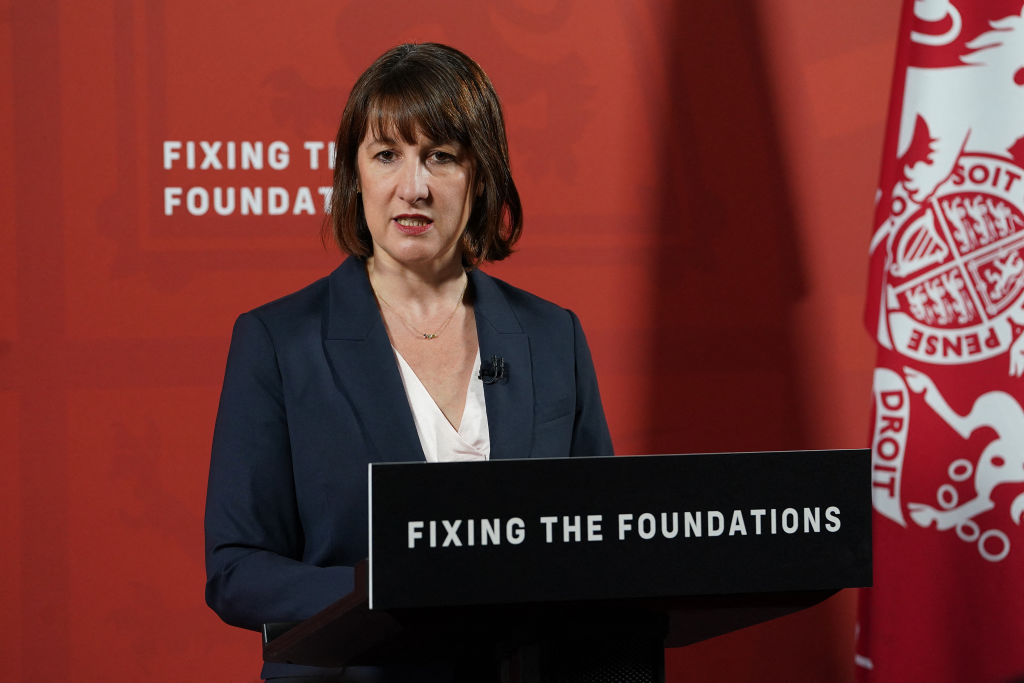Elon Musk to Taylor Swift - the four key figures who moved markets in 2024
We look at the four most influential people in 2024 who moved markets – from Elon Musk reshaping US politics to Rachel Reeves becoming Britain's chancellor

Get the latest financial news, insights and expert analysis from our award-winning MoneyWeek team, to help you understand what really matters when it comes to your finances.
You are now subscribed
Your newsletter sign-up was successful
Want to add more newsletters?

Twice daily
MoneyWeek
Get the latest financial news, insights and expert analysis from our award-winning MoneyWeek team, to help you understand what really matters when it comes to your finances.

Four times a week
Look After My Bills
Sign up to our free money-saving newsletter, filled with the latest news and expert advice to help you find the best tips and deals for managing your bills. Start saving today!
Elon Musk: the MAGA king-maker

Elon Musk spent millions in backing Donald Trump for the 2024 US election
When Elon Musk threw in his lot with Donald Trump, “pumping money into the campaign and using X to megaphone MAGA views”, it was a turning point in the US election campaign, says Al-Jazeera. Subsequent victory has united the world’s most powerful man with the world’s richest. Markets have been celebrating a promised beanfeast of tax cuts and deregulation.
The South African-born entrepreneur has already done very nicely financially from the “bromance”. Shares in Tesla, having gained some 92.4% in three months, are now in “record territory”, notes MarketWatch. His privately held space and satellite company SpaceX, meanwhile, has doubled in value to $350 billion in a year. Musk’s personal wealth has mushroomed to $439.4 billion, according to Forbes. There’s probably more to come as his “bet for the ages” on Trump pays off.
Is Musk driven by pragmatism or ideology? It was long thought to be the former, but in recent years, his messaging – particularly on free speech and immigration – has become more pointed, says the Financial Times. Musk’s fight against what he calls “the woke virus” was partially fuelled by his anger over the transition of one of his children. Musk is already flexing his newfound political muscle elsewhere. He has a burgeoning friendship with Italian PM Georgia Meloni and a deepening interest in bankrolling Britain’s Reform Party. Musk is reportedly plotting “a mega-tunnel” linking the UK with New York. That may not come to fruition, but it’s a metaphor for his ambitions on this side of the pond.
MoneyWeek
Subscribe to MoneyWeek today and get your first six magazine issues absolutely FREE

Sign up to Money Morning
Don't miss the latest investment and personal finances news, market analysis, plus money-saving tips with our free twice-daily newsletter
Don't miss the latest investment and personal finances news, market analysis, plus money-saving tips with our free twice-daily newsletter
Rachel Reeves: the worst chancellor ever

Rachel Reeves delivered the Autumn Budget on October 30
Few British chancellors have started out in office with as much political capital as Rachel Reeves, whose pragmatic decision to “go for growth” carried widespread cross-party support. Few have squandered it quite so dramatically. After six months in charge, a popular poll in the Daily Express this week asked: “Is Rachel Reeves the worst chancellor ever?”
Reeves got off to “an awful start” with her decision to means-test pensioner winter fuel payments, while colleagues were partying at freebie Taylor Swift concerts, says the paper. Her “brutal” Budget in October “sparked further fury” – prompting large-scale demonstrations from farmers and a lethally slow-burning business rebellion against a hike in employers’ national insurance contributions, dubbed “a tax on jobs”. Reeves’ much-vaunted “£22 billion black hole” has become “a million black holes in company balance-sheets”, said James Reed, boss of recruitment firm Reed.
“Rarely in modern times has a Budget unravelled so spectacularly,” says The Telegraph. Rather than fostering growth, Britain is now on recession watch. There’s a sense of betrayal – Reeves wooed companies with her smoked salmon and scrambled eggs, and then turned on business. Even fans, while acknowledging the magnitude of the fiscal challenge Reeves inherited, think the dour chancellor could do with a more “positive narrative”. “No more doom and gloom,” says Mariana Mazzucato of UCL in the Financial Times. We can but hope.
Elvira Nabiullina: Putin’s right-hand banker

Elvira Nabiullina is the governor of the Central Bank of Russia
If Russia has so far defied expectations that US and EU-led sanctions would sink its economy, much of the credit lies with Vladimir Putin’s long-standing central bank chief, Elvira Nabiullina – “one of the few” whose “mere presence at the helm can be enough to calm markets”, says The Economist. “A bespectacled technocrat whose unassuming demeanour conceals a ferocious intellect and drive”, Nabiullina, 60, “used to wow the Western banking establishment”. More recently, “she’s dealt deftly with the dramas generated by Vladimir Putin’s geopolitical ambitions”.
Still, there are growing signs of trouble in Russia’s “war economy”, says the Financial Times. Not least, “rampant inflation of staple food prices” – reports of supermarket heists for packs of butter are an ominous sign. In October, Nabiullina raised interest rates to 21%, prompting the rouble to slide below the psychological watershed of 100 to the dollar. Some reckon Putin and the Russian state are sitting on top of a social powder keg.
Born into a working-class family of ethnic Tatars in Ufa, Bashkortostan, she got her big break when she won a place at Moscow State University in the early 1980s, says The Moscow Times. Once a confirmed liberal, her partnership with Putin has lasted 20 years, says The Economist. It’s hard to know what motivates her. But she is seen by some as a key “bridge” between Russia and the global economy when the Ukraine war ends. The question is, “can she keep the ship on course until then?”.
Taylor Swift: the force behind Swiftonomics

Taylor Swift's The Eras Tour made $2.1 billion in sales
How influential is Taylor Swift? It was one of those questions capable of sparking family rows in 2024. But as “Tay Tay” quit the stage after the final concert of her two-year Eras tour in Vancouver, she could congratulate herself on setting another record, says The Guardian. The tour made $2.1 billion in sales – making it the highest-earning concert run in history, eclipsing the previous record of $939 million set by Elton John’s Farewell Yellow Brick Road. It was indeed an “era-defining tour”.
The phenomenon of “Swiftonomics” – the economic impact of the pop superstar – has been much discussed. This year, central bankers sounded the alarm over her impact on “sticky inflation” as tens of thousands of “Swifties” crowded out European hotel rooms. But it is perhaps Swift’s impact on the entertainment industry that will have the most lasting impact, says The Wall Street Journal.
“It’s time to break up Live Nation Ticketmaster. The American people are ready for it,” announced the US attorney-general, as he launched an anti-trust suit against the giant concert promoter with a reference to a Taylor Swift song. The company’s monopoly of the sector was highlighted when it botched her ticket sales. When her record company, Universal, boycotted TikTok in a battle over royalty payments, Swift defied it. There wasn’t much the label could do to stop her. Swift’s decision to endorse Kamala Harris in the US election came to nothing. But were she to spearhead the campaign to protect artists, and their incomes, from predatory AI “content-scrapers”, says the BBC, she would be doing the world a favour.
This article was first published in MoneyWeek's magazine. Enjoy exclusive early access to news, opinion and analysis from our team of financial experts with a MoneyWeek subscription.
Get the latest financial news, insights and expert analysis from our award-winning MoneyWeek team, to help you understand what really matters when it comes to your finances.
Jane writes profiles for MoneyWeek and is city editor of The Week. A former British Society of Magazine Editors (BSME) editor of the year, she cut her teeth in journalism editing The Daily Telegraph’s Letters page and writing gossip for the London Evening Standard – while contributing to a kaleidoscopic range of business magazines including Personnel Today, Edge, Microscope, Computing, PC Business World, and Business & Finance.
-
 How a ‘great view’ from your home can boost its value by 35%
How a ‘great view’ from your home can boost its value by 35%A house that comes with a picturesque backdrop could add tens of thousands of pounds to its asking price – but how does each region compare?
-
 What is a care fees annuity and how much does it cost?
What is a care fees annuity and how much does it cost?How we will be cared for in our later years – and how much we are willing to pay for it – are conversations best had as early as possible. One option to cover the cost is a care fees annuity. We look at the pros and cons.
-
 "Botched" Brexit: should Britain rejoin the EU?
"Botched" Brexit: should Britain rejoin the EU?Brexit did not go perfectly nor disastrously. It’s not worth continuing the fight over the issue, says Julian Jessop
-
 Ayatollah Ali Khamenei: Iran’s underestimated chief cleric
Ayatollah Ali Khamenei: Iran’s underestimated chief clericAyatollah Ali Khamenei is the Iranian regime’s great survivor portraying himself as a humble religious man while presiding over an international business empire
-
 'AI is the real deal – it will change our world in more ways than we can imagine'
'AI is the real deal – it will change our world in more ways than we can imagine'Interview Rob Arnott of Research Affiliates talks to Andrew Van Sickle about the AI bubble, the impact of tariffs on inflation and the outlook for gold and China
-
 Tony Blair's terrible legacy sees Britain still suffering
Tony Blair's terrible legacy sees Britain still sufferingOpinion Max King highlights ten ways in which Tony Blair's government sowed the seeds of Britain’s subsequent poor performance and many of its current problems
-
 How a dovish Federal Reserve could affect you
How a dovish Federal Reserve could affect youTrump’s pick for the US Federal Reserve is not so much of a yes-man as his rival, but interest rates will still come down quickly, says Cris Sholto Heaton
-
 New Federal Reserve chair Kevin Warsh has his work cut out
New Federal Reserve chair Kevin Warsh has his work cut outOpinion Kevin Warsh must make it clear that he, not Trump, is in charge at the Fed. If he doesn't, the US dollar and Treasury bills sell-off will start all over again
-
 How Canada's Mark Carney is taking on Donald Trump
How Canada's Mark Carney is taking on Donald TrumpCanada has been in Donald Trump’s crosshairs ever since he took power and, under PM Mark Carney, is seeking strategies to cope and thrive. How’s he doing?
-
 Long live Dollyism! Why Dolly Parton is an example to us all
Long live Dollyism! Why Dolly Parton is an example to us allDolly Parton has a good brain for business and a talent for avoiding politics and navigating the culture wars. We could do worse than follow her example